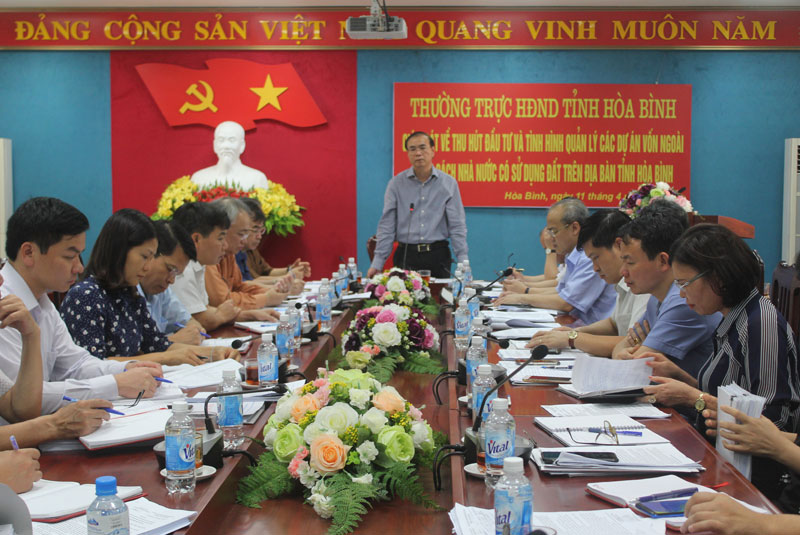
(HBO) - On April 11, a delegation from the provincial People’s Council led by Vice Chairman Hoang Van Tu inspected investment attraction and management of delayed projects using non-State capital and land in line with the Law on Land and the Law on Investment.
As of December 31, 2018, there were 525 projects in the
locality, including 39 foreign invested ones with a total registered capital of
670 million USD and nearly 430ha of land and 486 domestic projects valued at about
65.5 trillion VND and roughly 37,400ha of land. As many as 197 projects have so
far been terminated and revoked, including 19 FDI ones.
As of the late December 2018, 270 projects were put into
operation, 44 underway, 137 dealing with land procedures, site clearance and
other procedures, 35 delayed, 20 shut down production and trade, and 19 suspended.

Vice Chairman of the
provincial People’s Council Hoang Van Tu speaks at the event.
Vice Chairman of the provincial People’s Council Hoang
Van Tu suggested that the council should promptly study and issue a resolution
on the issue. The provincial People’s Committee will continue directing
investment attraction, earmarking local State budget to attract investment,
build infrastructure at industrial zones and complexes, prepare clean land sites
to draw investment, review delayed projects and offer all possible support to
investors. The provincial Department of Planning and Investment will advise the
provincial People’s Committee to issue decentralised management regulations for
projects using non-State budget, work more closely with State management
agencies to deal with administrative procedures, provide online public
administration services, especially in investment, construction, land, taxation
and finance, and improve the efficiency of choosing and evaluating projects.
Hoa Binh province is undergoing a dynamic transformation amid Vietnam’s national digital transition. Building on Poliburo’s Resolution No. 57-NQ/TW on breakthroughs in science, technology, innovation, and national digital transformation, the province has rolled out a wide range of practical action plans. A standout initiative is the "Digital Literacy for All” movement, an effort to ensure that no one is left behind in the digital era.
Hoa Binh province is undergoing a dynamic transformation in the wake of the national digital transformation movement. Building on Resolution No. 57-NQ/TW of the Politburo on breakthroughs in science, technology, innovation, and national digital transformation, the province has implemented a wide range of practical action plans. A standout initiative is the "Digital Literacy for All” movement ambitious effort to ensure that no one is left behind in the digital age.
With a spirit of unity and proactive problem-solving, the Party Committee, the government and the people of Dong Lai Commune (Tan Lac District) have made great strides in implementing the resolutions of the 24th Party Congress of the commune for the 2020 - 2025 term. Focusing on leadership and practical actions, the commune has brought the Party’s resolutions into daily life, creating strong impacts and pushing the local development forward.
Amid the nationwide push for digital transformation, young people in Hoa Binh Province are stepping up as dynamic pioneers, applying technology to enhance Youth Union operations and expand the reach of youth-led initiatives. Through creativity and adaptability, Youth Union organizations at all levels have introduced a series of practical solutions, contributing to modern governance and community development.
In recent years, An Nghia commune, located in Lac Son district, has stepped up administrative reform, focusing on improving the quality and efficiency of its single-window service unit for receiving and processing administrative procedures. These improvements have helped create favourable conditions for local residents and organisations to handle administrative procedures, contributing to the commune’s broader socio-economic development.
The Prime Minister-approved master plan to develop the multi-use value of forests ecosystems through 2030, with a vision to 2050, aims to improve the management and sustainable use of forest resources, create jobs, increase incomes, and improve the living standards of ethnic minorities, people in mountainous and remote areas, forest workers and those living near forests.



